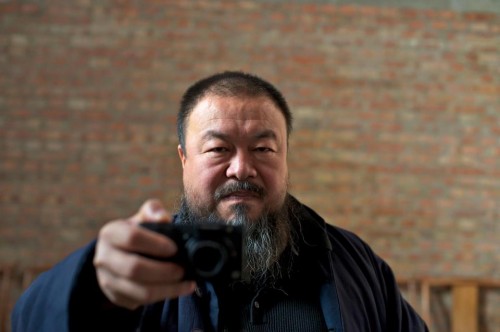Freedom of Speech Roundup
by Sampsonia Way / June 23, 2012 / No comments
In the Weekly Freedom of Speech Roundup Sampsonia Way presents some of the week’s top news on freedom of expression, journalists in danger, artists in exile, and banned literature.

Chinese artist Ai Weiwei was recently released from his bail terms. Below is a link to his comments on imprisonment, the events of this past year, and his desire for the future of China. Photo: Facebook, Ai Weiwei: Never Sorry
This week, freedom of speech endured a barrage of attacks throughout the world: An Azerbaijani photojournalist was released from imprisonment but now faces up to five years in jail. In addition, Tunisia faced some of the most violent riots in recent years after a local gallery displayed art deemed “un-Islamic.” The Committee to Protect Journalists (CPJ) released a special report on East Africa, where great numbers of journalists have had to flee their nation, and Google issued a report on an “alarming” increase of requests for content removal from countries you might not expect.
Also presented are the “lost” interview with Carlos Fuentes (1928-2012) and an extended profile with Syrian cartoonist Ali Ferzat.
Below are links to these and other relevant stories from June 13 to June 21, 2012.
Ai Weiwei: to live your life in fear is worse than losing your freedom
The Guardian. Recently released from the bail conditions of his secret two-month detention last year, Chinese artist Ai Weiwei comments on his imprisonment and the events of this past year as well as his desire for the future of China. Read Here
‘In the Current System I’d Be Corrupt Too’: An Interview with Bao Tong
The New York Review of Books. “If you define [communism] as everyone gets their freedom, then I think that’s right. How? By making laws and following laws, equally no matter for who or what position in society.” Read Here
Photographer freed but now facing possible five-year jail sentence
Reporters Without Borders. Azerbaijani photojournalist Mehman Huseynov, who was detained last week for “hooliganism” and “insulting and using force,” was released from jail by the court, but under the provision that he be tried on charges of “hooliganism and resisting the authorities.” Read Here
Attack on Art Gallery Leads to Riots in Tunisia
Ahram Online. Ultra-conservative Salafist Muslims are being blamed for a recent attack on an art gallery which contained artwork considered disrespectful to Islam. Read Here
Policy Mic. After the attack on the art gallery, radically conservative Islamists led riots across Tunisia for several days leading to one man’s death, the injury of 62 security officials, and 160 arrests. In response to the events, satirical cartoons began to circulate Facebook, but in secret, for fear of retribution. Read Here
Censors Block Lu Chuan Film
Variety. Chinese filmmaker Lu Chuan’s latest film, “The Last Supper,” has been barred release by the Chinese Film Bureau. Read Here
Russia, China, Tajikistan propose UN “code of conduct” for the ‘Net
Variety. Four nations recently introduced a “code of conduct” for ratification by the UN which may allow states “to censor or block international communications without any reason” under provisions to curb the flow of information from terrorist, extremist, seccesion-ist, or anti-government groups. Read Here
Google Reports ‘Alarming’ rise in Censorship by Governments
The Guardian. After compiling a report from six-months of requests for content removal, Google reports that the company in on track to quadruple last year’s number in requests and an “troubling” rise in requests from “Western democracies not typically associated with censorship.” Read Here
Why does Ethiopia want to give people 15 years in Jail for using Skype?
The Atlantic. A new law in Ethiopia blocks all Voice over Internet Protocol (VoIP) services such as Skype and Google Talk with the threat of a 15-year jail sentence for those who fail to follow it. Read Here
Journalists in exile: Crisis in East Africa
Committee to Protect Journalists. 57 East African journalists have fled their country in the past year and now must face “poverty and fear.” CPJ gives a special report on the lives of these journalists. Read Here
Q&A: Nadira Isayeva on exile from Dagestan in US
The Committee to Protect Journalists. “I feel more free now. I feel the whole world–the global world. It’s another experience, and I understand now what my friend, the human rights defender, said: ‘You need to go out, you need to go abroad, because everything you could do at your newspaper you did already.’” Read Here
Creative Dissent in Syria
Index on Censorship. While the Syrian regime wishes to silence Ali Ferzat, the satirical comic has no intention of letting anyone censor him. Read Here
Displaced by threats, old life gives way to new
Committee to Protect Journalists. Lucía Escobar, a Guatemalan journalist who was recently interviewed by Sampsonia Way, reports on her new life after fleeing her home in fear of violent retribution for a story she wrote. Read Here
The Hubris and Despair of War Journalism
Guernica. With methods of warfare changing with each battle, how has war reporting evolved in the past 100 years? Read Here
Carlos Fuentes: The Lost Interview
Guernica. “The Latin American situation has been very different in the first place, because writers have spoken for those who have no voice. The rate of illiteracy, poverty, joblessness in Latin America has been so great throughout our history that if the writers didn’t speak out for the people, nobody would.” Read Here




